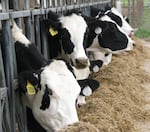
Cows at the dairy on the University of Georgia Tifton campus. Oregon state agencies approved another mega-dairy for Morrow County.
Clint Thompson/University of Georgia/Flickr
The second largest mega-dairy in Oregon has now received a permit it needed to get up and running. The dairy will house roughly 30,000 cows near the Columbia River in the Eastern Oregon town of Boardman.
The Oregon departments of Agriculture and Environmental Quality jointly issued a wastewater permit for Lost Valley Farms. Dairy operators said the permit now means it will begin operating “in the coming weeks.”
The mega-dairy will take up 7,288 acres on the site of the former Boardman Tree Farm. It will supply milk to the Tillamook County Creamery Association at the Port of Morrow.
The dairy has faced strong criticism from environmental opponents and small farmers who say it will harm water and air quality in the region. State agencies say they received an unprecedented number of comments – roughly 4,000 — for this type of permit.
Bruce Pokarney is a spokesman for the Oregon Department of Agriculture. He said this permit is the most protective of surface and groundwater the state has ever issued.
“I think there are a lot of things built into that permit to make sure the waters of the state are protected and that the dairy can operate without having an impact on environmental concerns,” Pokarney said.
The permit regulates manure and wastewater application on crops that the farm will grow. It requires the dairy to:
- Install a synthetic double liner on its manure lagoons, with a leak detection system;
- Collect and report lagoon data;
- Establish 11 groundwater monitoring wells;
- And monitor soils.
Pokarney said the department will inspect Lost Valley Farms at least three to four times per year, like it does with all large dairies.
The area is already plagued by high levels of nitrates, which Pokarney said is one reason for the stringent permit and increased monitoring of Lost Valley Farms. Nitrates pollution can be harmful to infants, adults with compromised immune systems, and women who are trying to become pregnant.
ODA said the dairy is permitted to have up to 30,000 cows. It plans to have a little more than half that, 16,500 cows, in its first year, ramping up its operations over a three-year period.
Still, environmental groups are concerned about the permit and the dairy. Lauren Goldberg is a staff attorney with Columbia Riverkeeper.
"We are looking to the state to protect people that rely on drinking water near factory farms, that live near rivers near factory farms, and that breathe air — people that are directly impacted from the state's decision," Goldberg said.
This permit didn't address several issues people brought up, including air quality concerns. A bill in the Oregon Legislature is seeking to regulate air pollution from large dairies in the state.
Ivan Maluski, policy director for Friends of Family Farmers, said he was disappointed with the decision to issue the permit.
"This decision also exposes Oregon's 'don't ask, don't tell' approach for air pollution from mega-dairies. We would expect this kind of approach to major sources of air pollution from the Trump Administration, not Governor Kate Brown," Maluski said in an emailed statement.
Opposition groups said they will ask the state to reconsider its decision to issue the permit. They are also fighting a transfer of water rights between Lost Valley Farms and a neighboring landowner, which the dairy needs to operate.
Lost Valley Farms owner Greg te Velde said in a statement that he's committed to protecting groundwater quality and quantity in the region.
"We believe that a well-run dairy should proactively implement environmental protections and earn its place in the community. We have agreed to all requirements of the CAFO permit issued today," te Velde said.
The permit is expected to take effect in mid-April.
